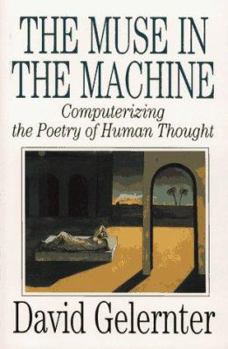The Muse in the Machine
Select Format
Select Condition 
Book Overview
A leading mind in the world of artificial intelligence answers the provocative question: "Can we introduce emotion into the computer?" Can we introduce emotion into the computer? David Gelernter, one... This description may be from another edition of this product.
Format:Hardcover
Language:English
ISBN:0029116023
ISBN13:9780029116029
Release Date:March 1994
Publisher:Simon & Schuster
Length:211 Pages
Weight:1.05 lbs.
Dimensions:0.9" x 6.4" x 9.6"
Customer Reviews
2 ratings
Emotions as Interpretations of Reality
Published by Thriftbooks.com User , 23 years ago
Gelernter recognizes that the mind is a functional part of the human being. It evolved to help the entire being function within its environment and to say the same thing its functions are defined by the need of the human being to function within that environment. The mind is not an abstract device separated from reality as is the common assumption.Gelernter identifies the bases of the mind's mechanisms as emotions and memory. By emotion, Gelernter means a way by which the organism can capture and characterise its current state. The commonly known emotions of fear and hunger are obvious examples of this but Gelernter expands this to include very fine-grained feelings that blur the lines between the distinct feelings that are commonly viewed as emotions. He shows how a composite feeling of contentment and anticipation on a boat trip can be viewed as a distinct emotion, for example. With this ability to finely characterize a situation by an emotion,the organism can identify similar situations that it met in the past. It can then select its actions based on the success or failure of actions in past similar situations. His view of the mind is similar to the common engineering techniques of case-based and memory-based reasoning.However Gelernter expands on these common models by showing how his views on emotions link to poetry as an example of a higher human faculty that is commony thought to be unexplainable at the functional level. Gelernter identifies that the method for matching of situations by emotional memory may by either loosely of tightly focussed. Tight foucus is conventional reasoning in which details are important. Loose focus allows apparently disparate situations to be matched based only on the structure of the connections in the consitituent emotions. This type of reaosning is what Gerlernter states as the source of creativity. It is what allows a poet to find common ground with his reader as Gelernter demonstrates with his comparison of his idea to T.S. Eliot's 'objective correlative.' Gelernter shows his ideas with examples from the English Romantic poets and from apparently inexplicable passages from the Bible which can be explained as examples of loosely focussed emotional connectivity.A book which has references to AI, the Bible, English Romantic poets and more is of course interesting. Rdferences in the book to authors as diverse as marvin Misnky. Shelley, Byron and the author of Geneisis must makw this a unique book.This book is worth reading.
A good book to read even if you disagree
Published by Thriftbooks.com User , 24 years ago
Without question, two of the potentially most exciting and disturbing events that could occur in the future involve non-human intelligence. The "discovery" of extra-terrestrial intelligence(ETI) or the unambiguous creation of human-equivalent machine intelligence(AI) go to the very foundations of our biases. Based on nebulous foundations and consisting of extrapolation and speculation, both fields force intense examination of human thought and behavior. Fraught with implicit assumptions and mired in centuries of homo-centric religious and political attitudes, both are difficult to objectively examine. In this book Gelertner argues that AI is impossible because intelligence requires emotion and a body is a necessary condition for emotion. His arguments are some of the most interesting ever put forward. Using biblical passages that appear incomprehensible, Gelertner argues that early humans thought differently than the modern versions. An emotional interpretation based on non-linear thinking is what he believes allows for a "rational" understanding. Drawing on many other experiences, including visions, spirituality and creativity, the point is strongly put forward that these events are not governed by sequential rules and therefore cannot be simulated on a digital computer. Unfortunately, his arguments,like so many in AI, are fallacious and circular. When the word intelligence is used, the implicit assumption is "human intelligence", as the title clearly suggests. The argument then becomes: It is impossible to have a computer express the emotional content of human poetry as that requires human emotions. A human body is necessary for human emotion and no machine can possess such a thing. Therefore, AI is impossible.Which is correct, such as it is. Any object, even an artificial one, that possesses a human body and human emotions is by definition human. However, there is no guarantee that human intelligence is the only possible one. If ETI exists, we have no idea what form it has. It may be that emotion is not necessary for intelligence and could even be a limiting force. There may be beings in the universe that would consider humans to be primitive dreamers forever locked in fantasy. Furthermore, some marine mammals may be intelligent and it is only human arrogance that prevents observation of that fact. Even if you strongly disagree with the conclusions of the author, this is a book you must read if you are interested in the AI problem. As is clear from the comments above, I disagree and yet found it so interesting that I read it twice. AI is a synthesis of religion, psycology, philosophy, mythology and computer science. Anything that contributes to healthy debate of these issues is to be welcomed. Published in Mathematics and Computer Education, reprinted with permission.






